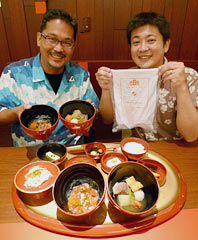Ryukyuan dishes without pork appeals to Muslim tourists

On June 7, at the Ryukyuan Restaurant Yotsudake in Kumoji, Naha, manager Dennis Tortona from the OTS (left) and Katsunori Taira from Yotsudake promote Ryukyuan dishes created in conjunction with Halal foods.
June 8, 2012 Sadaharu Shimabukuro of Ryukyu Shimpo
In order to attract foreign tourists from Islamic countries, collaborating with six hotels and restaurants in Okinawa, the Okinawa Tourist Service (OTS) drew up a project involving Ryukyuan dishes with Halal foods that Muslims are able to eat.
On June 10 and 11, the Ryukyuan dishes will be served to two groups of approximately 100 tourists who will visit Okinawa from Singapore. OTS will reserve places for the five prayers of Muslim practice. It is the first step by the OTS to target tourists from the Islamic world of over 1 billion people. Halal means “permissible” in Arabic and indicates what is legal conduct under Islamic law. Foods that are properly processed according to the law apply for a Halal mark of certification and are sold overseas. Japan also imports such Halal foods.
Muslims are forbidden to eat pork, and other meats such as beef and lamb also need to be handled according to prescribed methods of slaughtering. Alcohol including cooking sake and mirin is strictly prohibited as is the use of cooking utensils that have been used to prepare prohibited foods.
According to the OTS, Okinawa not catering for Halal or worship practices has made it difficult to attract tourist groups from Islamic areas of the world, but from January the OTS has started to prepare to accept Muslim visitors.
A Ryukyuan restaurant in Naha, Yotsudake, will serve a set dish of stew with Halal beef, kubu irichi (stir-fried seaweed) without pork, plus bonito broth.
Assistant sales manager of Yotsudake Katsunori Taira said, “Thanks to the OTS we came to know of the word Halal and have begun to look for Halal-approved ingredients. This project is a great opportunity for us to learn how to serve tourists from Islamic societies.”
The project planner, Dennis Tortona of the OTS International Operation head office emphasized, “Lacking any record of using Halal in the past, we have not done very well at all with sales in Southeast Asia, but now with cooperation from various areas, I hope that our plans will come together. This project will help us to attract more tourists. “
Previous Article:Kimura completes four-year circumnavigation of the world
Next Article:Hirayama catches a big bluefin tuna two years in a row
[Similar Articles]
- Availability of Halal food is key factor for attracting Muslim travelers: survey
- Okinawa Halal Chamber launched to advance into Islamic market
- Okinawa Tourist Service issues guide booklet for Muslim travelers
- Sweet Bakery Porsche gets halal certification for its Beniimo tart
- Okinawan pork exports to Hong Kong reach a new high
 Webcam(Kokusai Street)
Webcam(Kokusai Street)


